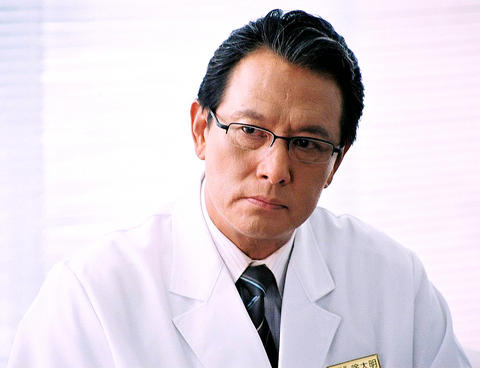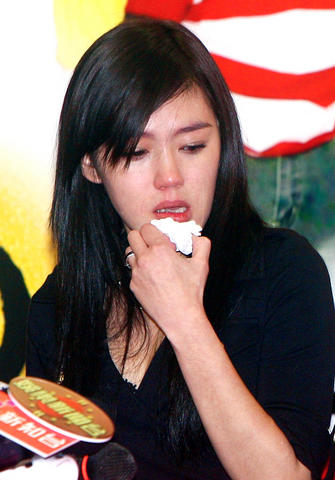The most embarrassing moment in the Golden Bell Awards' (金鐘獎) 42-year history came to light on Monday when the jury panel confessed that a top honor, the Best Supporting Actor accolade, was awarded to the wrong person at the ceremony on Saturday. The real winner was Hong Kong-based Chang Chia-nien (張嘉年), also known as Tai Pao (太保), not veteran actor Chang Kuo-chu (張國柱).
Jury committee convener Wang Chang-an (王長安) explained that the two nominees' similar-sounding names confused the awards ceremony presenter, which is the same as saying, "Oops, we handed the envelope to the wrong person."
What showbiz pundits are wondering is how badly the jury members squirmed on the night of the awards ceremony, which was televised live.

PHOTO: COURTESY OF CTV
An anonymous source, quoted in the Chinese-language press, claims jury members were called back for an emergency meeting during the ceremony. Official statements indicate the jury assembled on Sunday to formulate a damage-control policy and came up with a solution that was supposed to make everyone happy: the award goes to both Changs.
Gracefully accepting the trophy that didn't actually belong to him, Chang Kuo-chu couldn't help but voice his discontent by saying to the local press: "Rather than a celebration party, I'll just treat everyone to a bowl of Udon noodles [Udon is written as 烏龍 in Chinese, a term that means 'daft mistake']."
A third wave of police raids on celebrities suspected of using drugs officially began last week when newly crowned showbiz caner Suzanne Hsiao (蕭淑慎) was busted with 30.4g of cocaine, 2g of ketamine and drug paraphernalia sitting in her rented apartment. Shortly after Hsiao's arrest, starlet Pei Lin (裴琳) was brought to the police station and confessed to having been puffing the magic dragon for a couple of years.

PHOTO: TAIPEI TIMES
Prosecutors hinted that there are at least three more female stars and two basketball players on their to-bust list, which promises more grist for the media mill.
A new computer game (ent.163.com/special/000327LU/ziyibaolian.html) puts into action the ongoing speculation on the unspoken rivalry between Chinese stars Zhang Ziyi (章子怡) and Tang Wei (湯唯). The aim of the game is simple: Zhang has to kick Tang out of her way on the red carpet in order to give Ang Lee (李安) a hug.
The inspiration comes from Zhang's well-known complaint that Lee didn't give her a hug of encouragement during the shooting of Crouching Tiger, Hidden Dragon (臥虎藏龍) while Tang has been the center of Lee's countless praises.
In other film-related news, with John Woo's (吳宇森) epic period drama Red Cliff (赤壁) nearing the end of shootng this month, China Central Television last Saturday took the lead in examining the big-budget, Asian-financed film and revealed details of the movie's star-studded cast, which didn't score well with the Chinese Net-using public.
It is opined that Tony Leung (梁朝偉) looks too old to play the character Chou Yu (周瑜) and Takashi Kaneshiro (金城武) too sissy for Chu-ko Liang's (諸葛亮) part. Chang Chen (張震), however, stands out from the crowd for his insidious enough looks to bring Sun-chuan (孫權) to the big screen.

April 28 to May 4 During the Japanese colonial era, a city’s “first” high school typically served Japanese students, while Taiwanese attended the “second” high school. Only in Taichung was this reversed. That’s because when Taichung First High School opened its doors on May 1, 1915 to serve Taiwanese students who were previously barred from secondary education, it was the only high school in town. Former principal Hideo Azukisawa threatened to quit when the government in 1922 attempted to transfer the “first” designation to a new local high school for Japanese students, leading to this unusual situation. Prior to the Taichung First

In the March 9 edition of the Taipei Times a piece by Ninon Godefroy ran with the headine “The quiet, gentle rhythm of Taiwan.” It started with the line “Taiwan is a small, humble place. There is no Eiffel Tower, no pyramids — no singular attraction that draws the world’s attention.” I laughed out loud at that. This was out of no disrespect for the author or the piece, which made some interesting analogies and good points about how both Din Tai Fung’s and Taiwan Semiconductor Manufacturing Co’s (TSMC, 台積電) meticulous attention to detail and quality are not quite up to

Chinese Nationalist Party (KMT) Chairman Eric Chu (朱立倫) hatched a bold plan to charge forward and seize the initiative when he held a protest in front of the Taipei City Prosecutors’ Office. Though risky, because illegal, its success would help tackle at least six problems facing both himself and the KMT. What he did not see coming was Taipei Mayor Chiang Wan-an (將萬安) tripping him up out of the gate. In spite of Chu being the most consequential and successful KMT chairman since the early 2010s — arguably saving the party from financial ruin and restoring its electoral viability —

The Ministry of Education last month proposed a nationwide ban on mobile devices in schools, aiming to curb concerns over student phone addiction. Under the revised regulation, which will take effect in August, teachers and schools will be required to collect mobile devices — including phones, laptops and wearables devices — for safekeeping during school hours, unless they are being used for educational purposes. For Chang Fong-ching (張鳳琴), the ban will have a positive impact. “It’s a good move,” says the professor in the department of